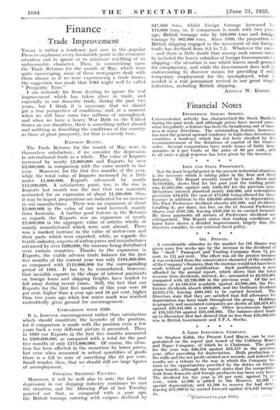Finance •
-Trade Improverhent- THERE is rather a .tendeney just. now in the ,popular Press to emphasize every favourable point in the economic situation and to ignore or to minimize anything of an unfavourable character. Thus, in commenting upon the Trade. Returns for the month of May, which were quite encouraging, some of these newspapers *dealt with them almost as if we were .experiencing a trade boom ; the suggestion was made that 1985 might well be called " Prosperity Year."
I am certainly far from desiring to ignore the real improvement which has taken place in trade, and especially in our domestic trade, during - the past two years, but I think it is necessary that we should get a true perspective of conditions, and, at a moment when we still have some two millions of unemployed, and when we have a heavy War Debt to the United States on our shoulders, there is something rather absurd and unfitting in describing the conditions of the country as those of great prosperity, for that is scarcely true.
EXPORTS RISING.
The Trade Returns for the month of May were in themselves satisfactory, if we consider the depression in international trade as a whole. The value of Imports increased by nearly £3,000,000 and Exports by over £3,000,000, in comparison with the same month in last. year. Moreover, for the first five months of the year, while the total value of Imports increased by a little under £1,000,000, Exports advanced by nearly £15,000,000. A satisfactory point, too, in the rise in Imports last month was the fact that raw materials accounted for an expansion Of about £1,500,000, thus, it may be hoped, preparations are indicated for an increase in our manufactures. There was an expansion of about £1,000,000 in the value of raw wool received, mainly from Australia. A further good feature in the Returns as regards the Exports was an expansion of nearly £2,000,000 in the aggregate value of articles wholly or mainly manufactured which were sent abroad. There was a marked increase in the value of motor-cars and their parts which were exported, .while, as regards the textile industry, exports of-cotton yarns and manufactures advanced over £200,000, the increase being. distributed over various countries. Thanks to the expansion in Exports, the visible adverse trade balance for the first five months of the current year was only £104,800,000, as compared with £119,000,000 for the. corresponding period of 1934: • It has to be remembered, however, _ – that invisible exports in the shape of .interest payments on foreign loans and shipping freights have tended to fall away during recent years. Still, the fact that . our Exports for the first five months of this year were 10 per cent. higher than a year ago and 18 per cent..higher than two years ago when low water mark was reached undoubtedly giVes ground for encouragement.
COMPARISON WITH 1929.
It is, however, encouragement rather than satisfaction which should Constitute the keynote • of the position, for if comparison is made with the position even a few years baCk a very different picture' is presented. Thus, in 1929 our Exports. in the first five months. amounted to £.309,000i000, as compared with a total for the past five months of only 1174;000,060. - Of course; the situa- tion has-been affected in the meantime by-lower prices, but even when measured in actual quantities of goods there is a fall to note of something like 25 per cent. Small wonder, then, that we should still see large figures of unemployment. " - •
STRIKING -SHIpPIN‘;',.. IGURES.
Moreover, it will be well also to note the fact that depression in our shipping industry continues to mar the situation, and the Morning Post of last Tuesday pointed out that, as compared with a year ago, the British tonnage entering with cargoes declined by 347,000 tons, whilst foreign tonnage increased by 119,000 tons, or, if comparison is made with two years ago, Biitisb -tonRage rose by 126,000 .tons and ftikeign tonnage by 902,000 tons. Since 1930, the proportion of British shipping engaged in the movement of our foreign trade has. .declined_frorn 9,5.to 7.5. Whatever the cause —and there is little doubt that among such causes must be included the heaVTsubSidies of foreign Governments to shippingthe 'situation is one leaves small ground for complaceney, and.while the •Government does well in endeavouring .to discover means for providing if only temporary employ-ment for - the- unemployed, what is needed is. a real permanent revival in our great staple industries,.. including 'British shipping.
ARTHUR W. KIDDY.








































 Previous page
Previous page